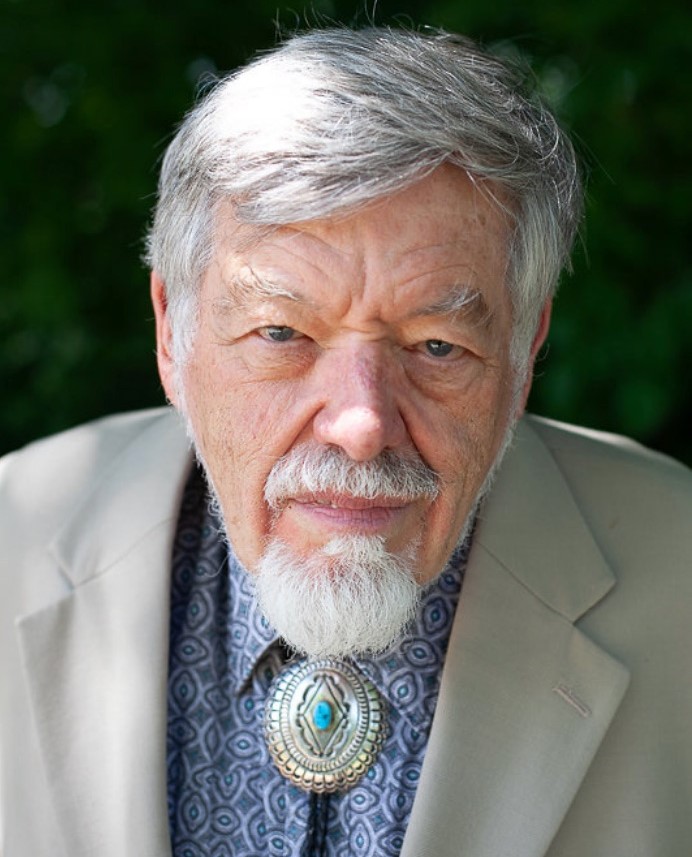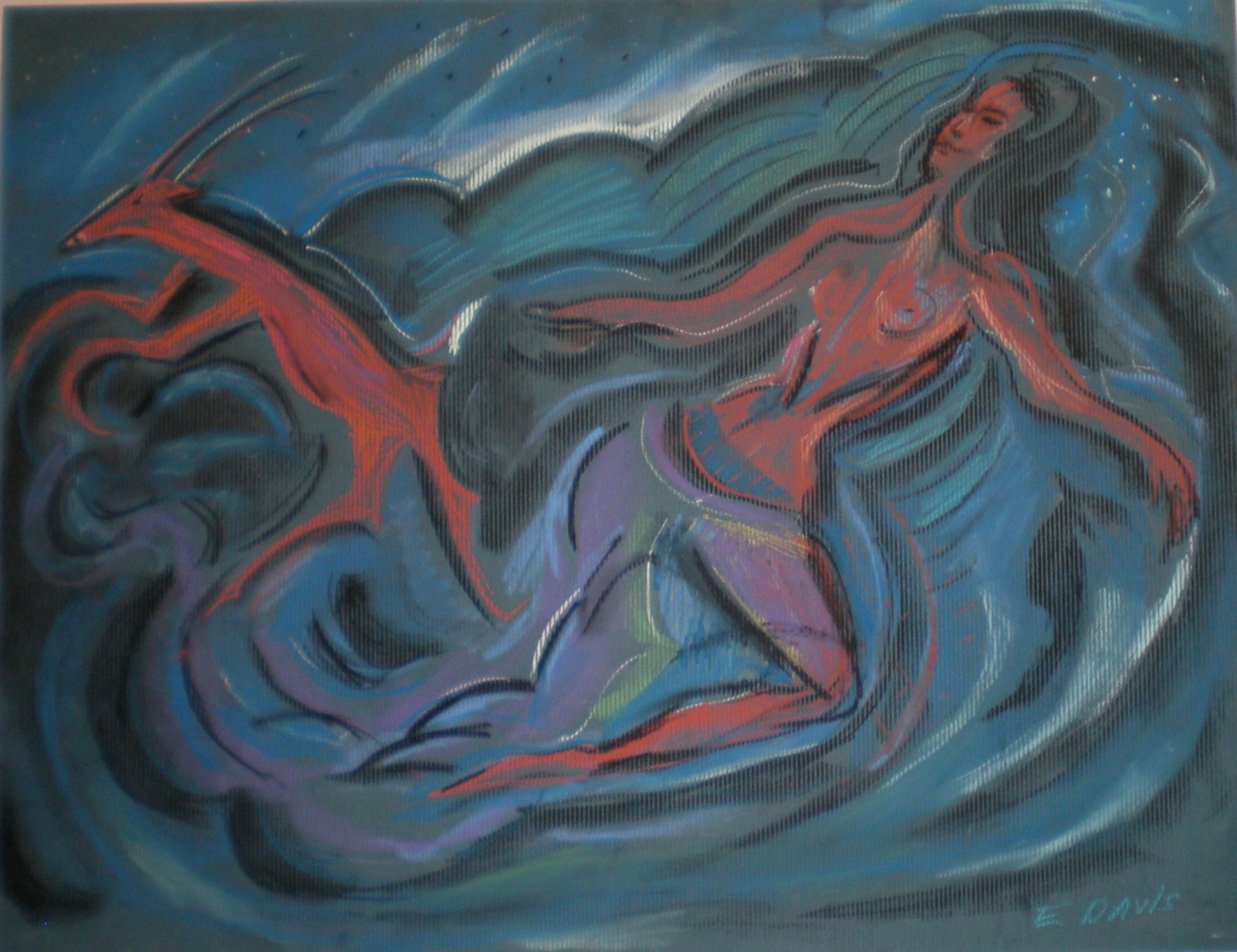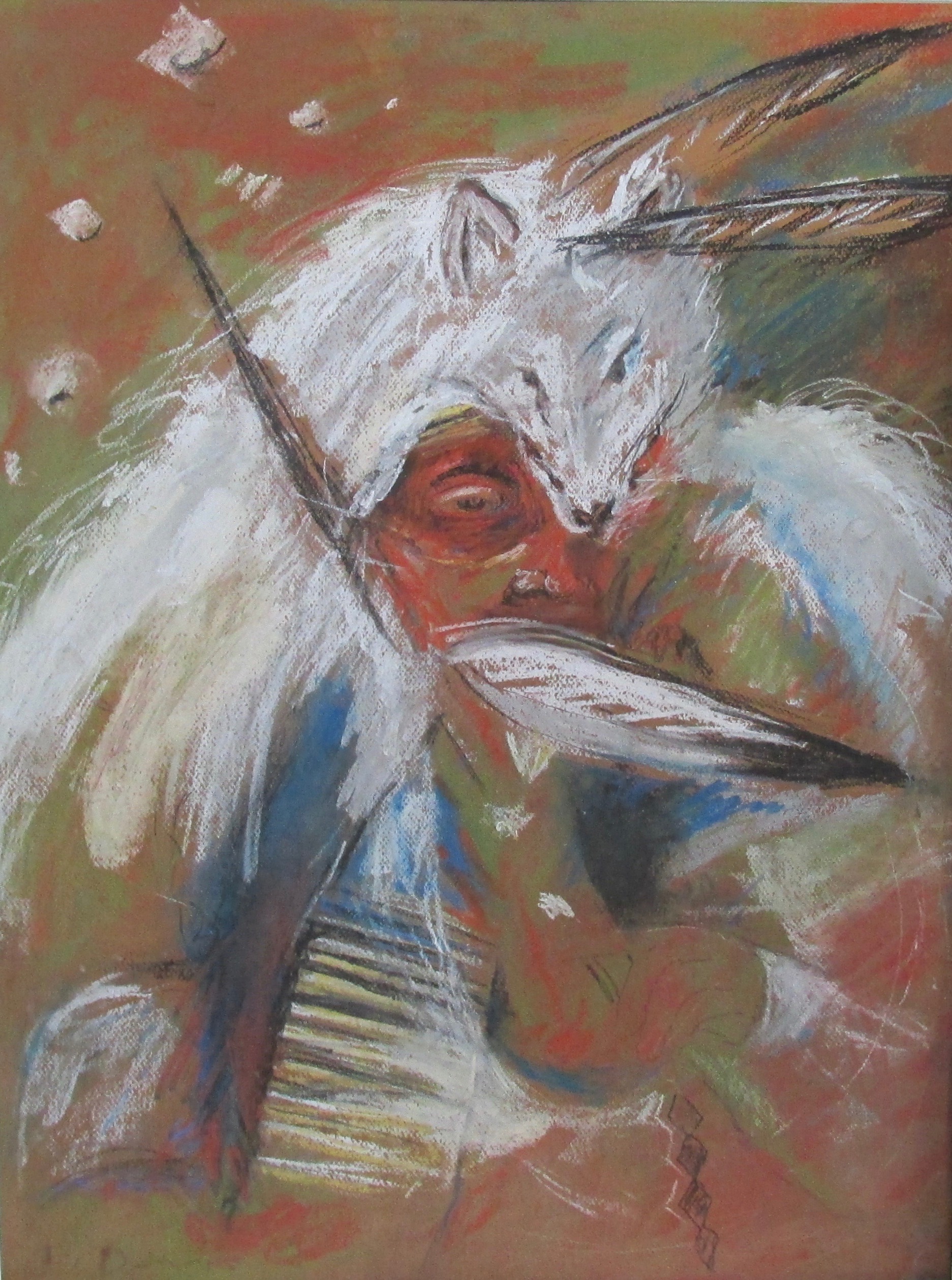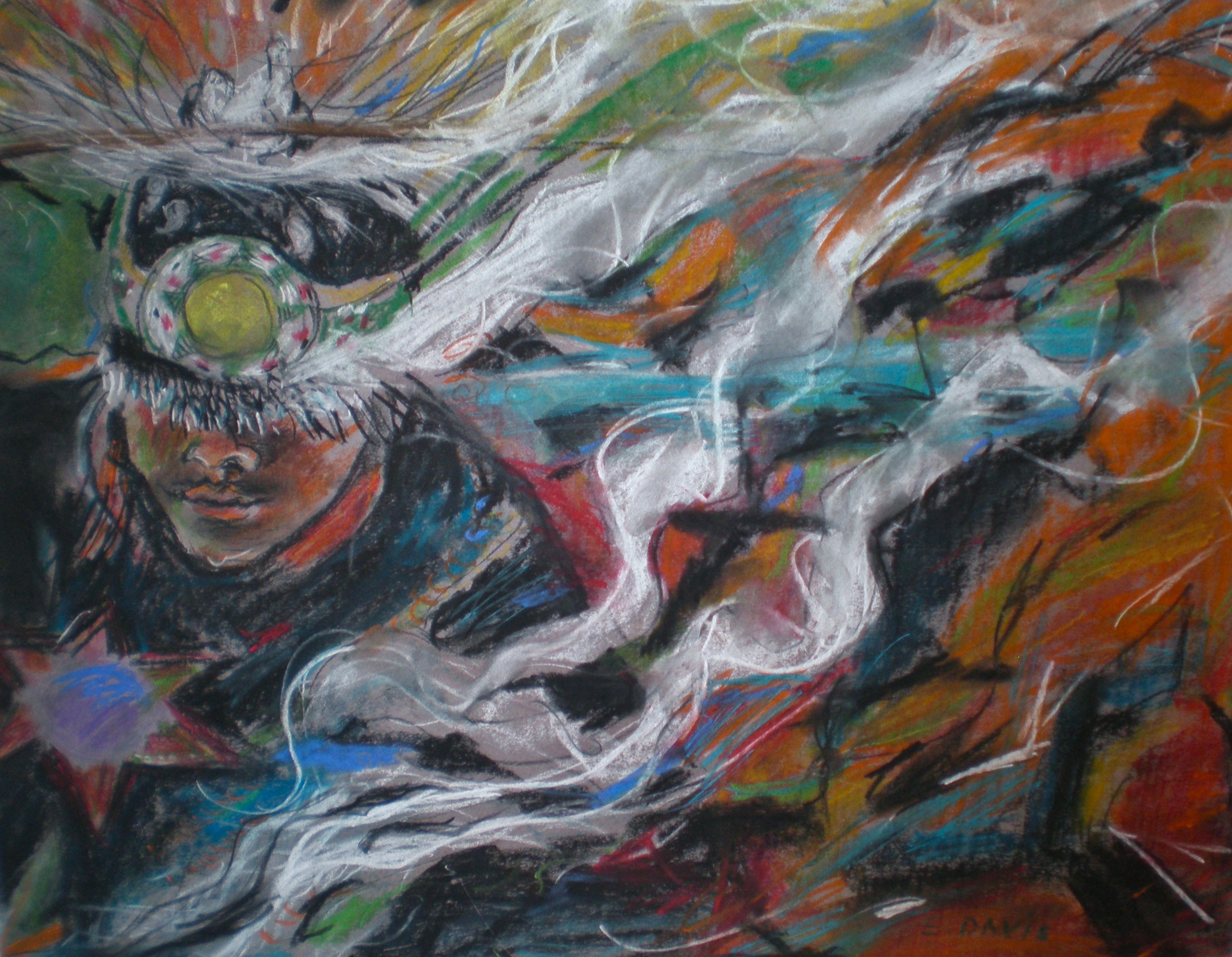*****
Thomas Davis has had a long career in American Indian education, starting with the Menominee County Community School in Northern Wisconsin, one of the first Indian controlled schools that founded the Coalition of Indian Controlled School Boards in 1972, through the founding of the College of the Menominee Nation to positions as the president or chief academic officer at Lac Courtes Oreilles Community College (Wisconsin), Fond du Lac Tribal and Community College (Minnesota), Little Priest College (Nebraska), and Navajo Technical University (New Mexico and Arizona). At Bay Mills Community College (Northern Michigan) he worked with the college and Indian Head Start in Washington DC to establish one of the earliest virtual degree-granting colleges in the United States.
He has had an equally long career as a poet and writer. In addition to his current book of poetry, Meditation on Ceremonies of Beginnings, his novel, In the Unsettled Homeland of Dreams won the Edna Ferber Fiction Award in 2019. He has had two book-length epic poems published, The Weirding Storm, A Dragon Epic, published by Bennison Books in Great Britain and An American Spirit, An American Epic, which tells the story of the Menominee Warrior Society’s takeover of the Alexian Brother’s Novitiate in Wisconsin. His nonfiction book, Sustaining the Forest, the People, and the Spirit is about the sustainable development history and practices of the Menominee Indians of Northern Wisconsin, and he has had three other novels that have appeared in print as well as poetry, essays, and short stories. He has edited three small magazines and co-edited two major anthologies of poetry, No More Can Fit Into the Evening that includes poetry from around the English-speaking world and The Zuni Mountain Poets. With his wife, the poet-artist Ethel Mortenson Davis, he owns Four Windows Press, a small publishing house.
*****

The poems included in this feature have all been taken from Meditation on the Ceremonies of Beginnings, which is reviewed below by John Looker. In this collection, Davis tells stories, written in poetic form, that come from his long experiences with the people and the history of the tribal colleges and universities movement in the United States as well as the founding of the World Indigenous Nations Higher Education Consortium, which he also played a role in helping to develop.
All artwork © Ethel Mortenson Davis who has kindly given permission for it to be reproduced here.
*****
*****
Thomas Davis’s Meditation on Ceremonies of Beginnings reviewed by John Looker
Meditation on Ceremonies of Beginnings by Thomas Davis. £18. Tribal College Press (distributed by Ingram) ISBN: 978-0-9845472-4-1
Here is a book that records a historic struggle as it unfurled. Brought together at the insistence of others, these poems document the struggle of Native Americans and indigenous peoples of other countries to set up colleges of further and higher education – all part of a wider endeavour to achieve self-determination and recognition for First Nations.
The poems were written over many years as personal gifts to friends and colleagues. There was no thought of publication at the time, although Thomas Davis has had collections published in the USA and beyond. They were his personal reflections on fast-moving events in which he was deeply involved. He would write them in the margins of meetings; he would give them away to colleagues and friends as personal tributes or testimonies; they were written on napkins, on hotel stationery and scraps of paper; they were given to others without copies being kept at the time.
There is therefore an immediacy in the writing. Sometimes we feel we can spot the late night or the rush to catch a flight. There are traces of personal friendships and alliances in the dedications, and evidence of weariness and tension between the lines, as well as moments of sheer joy. A human story is recorded in lines of American free verse as events unfold.
The poems vary in tone and register, as one would expect. On a very personal level there are portraits of people, such as this:
In the great woods of Minnesota he once sighed,
“I like trees, but I feel like I’m in prison here.
I need an endless sky to feel alive.”
Let cranes dance in fields by the river.
Let the moon rise ghostly in the river’s mist.
Let the sun blaze in an August sky.
Let the miles go on and on to the horizon.
For Jack Barden is gone; my friend is gone.
Equally personal is a poem recording a difficult conversation between Thomas Davis and a rebellious student who had been expelled from his dorm, and another with a young woman whose confidence had been sapped by ‘the reservation woes that went on and on / with family and addictions and anger’. There is a scene of inexperienced colleagues working through the night to complete a grant application that should have (and could have) been completed much earlier. Very notable is a long poem which, while being a eulogy to an influential woman, records her courage and that of her father in resisting the Ku Klux Klan in North Carolina when the Klan turned on Native Americans there.
Many of the poems remember conversations and record various voices: the monologues and dialogues of Robert Browning come to mind, although the verse is thoroughly modern North American.
On other occasions the register is very different. We observe conferences and meetings, as in the poem ‘At a Kellogg Foundation Meeting in Mesa, Arizona’. This is no dry bureacratic memo however as it describes the unbridgeable cultural gulf between a University Chancellor and Native American representatives. Another poem gives us a senior tribal leader reminiscing about his dealings with the Navajo, the Sioux, the Winnebago and others. And there is a striking personal reminiscence of that dreadful day that Americans refer to as Nine Eleven in which Thomas Davis records his arduous journey home by rented car across several states in the aftermath of the terrorists’ attacks.
Davis’s work eventally took him beyond the United States as he engaged with native peoples’ movements in Canada, Australia, New Zealand and elsewhere. An international movement for higher education is celebrated. ‘Calligraphy of Hills’ reflects that ‘we had come together, not trying to find oneness, / but to listen and find new hope’.
Back home at an American tribal conference Thomas Davis danced, we learn in ‘Difficult Country’, for two hours. Then he reflects:
We discuss. We move. We sing. We dance.
But where are we going?
The winding of generations
of difficult histories into this place, this room?
And in a moment of eyes
when voices have stopped blazing,
I think, where is all of this going?
And I think, my God this is a difficult country.
And then I remember the Pow Wow,
and I hear drums,
and I know we are all here—
where the river bends, hills rise,
and ancient people watch
brown cranes
winging into late summer sky.
This is a moving book. It does not refashion Poetry or lead it to new heights. But it is thrilling to see how someone deeply embedded in the hurly-burly of political and administrative life should turn so naturally and effectively to poetry to record and reflect on events. It is touching to know that most of these poems were written as gifts for others and presented to them as shared momentos. We sense the passion that Thomas Davis and his colleagues and fellow campaigners felt; we learn of their debates, their struggles with bureacracy and their own naivety, and eventually their progress as they found a way foward, the outcome always uncertain.
John Looker lives in south east England. His poetry has been published in print and online journals in Britain, the USA, India and Australia and in anthologies in the USA and Britain. A recent poem was Highly Commended in New Zealand’s Causley Trust International Competition and he was featured in the commemorative anthology of the Texas International Poetry Festival’s 20th anniversary. His first collection, The Human Hive, published by Bennison Books in 2015, explored life by looking at work down the ages and round the globe.
*****
Thomas Davis: Three Poems from Meditation on Ceremonies of Beginnings
RIVER OF PEOPLE
There’s this river, Carty Monette said,
that you see from the distance,
and it looks shining and beautiful,
a good place to visit,
but when you walk up to its banks,
you see it’s a river of people,
and all of those people are in pain,
and they’re crying for themselves,
or crying out for help,
or they’re sinking below terrible currents
flowing toward a sea over hills,
past mountains, around the bend.
Some struggle for shore,
arms flailing and bodies twisting,
and a few make it,
but even though a few make it to the riverbanks,
it’s still a river so big
it sometimes seems to be the world.
Some of those who find the river
take one look and go back to their valley
in woods where water’s sound
helps them sleep at night.
Others come to the river’s bank,
and they reach out hands
and start trying to save those closest to shore.
Others see the river,
and it confuses them so much they get too close,
and they fall into the flow
and join in the wail of suffering
that makes earth tremble,
mind recoil with anguish and fear.
Those who grasp a hand and are saved from the river
usually get away from it as fast as they can
and find their way into the world
where the sun rises every morning
and on a clear night moonlight shines
on a still lake’s dark waters.
But some join others on the river’s bank,
and they start saving those few they can reach,
and some of those who have found the river
and get out of the river
keep reaching out for hands and minds
while working upstream,
trying to find the river’s source,
and in these people lies part of the world’s hope.
I once told Jack Briggs, before he died,
that he was one of those people who were in the river
and turned around once he was on the bank
and reached out to those he had left behind.
I also told him he was one of those
trying to find the river’s source
so that pain and trouble could be taken from waters,
and the river could flow free of people to a shining sea.
But sometimes I stand on the banks of that river,
and I see faces of people I know,
and I hear cries of those whom I love,
and I feel myself slipping into the river’s flow,
and I have to turn around and reach out for other hands
in an effort to save myself.
And in those times, in the grasp of other hands,
I know the glory of humankind
even though cries of misery and pain fill my ears—
and in those times I lift my eyes to the hills
and see a shining horizon
and a wing-spread golden eagle’s wheeling flight
making alive cloudless blue skies—
in those times I search for hope
and listen to songs of healing my wife has sung,
and I know the river of people
is in the world, but is not the world.
There are valleys where yellow meadows shine
amidst the gentle darkness of great forests,
and there are villages and towns
where people talk and sing and make love
and walk the good path, the spiritual path, the real
path of human beings.
*****
CALLIGRAPHY OF HILLS
The calligraphy of hills,
ridges that fell from sharp, tented peaks
and trees carpeted green on steep slopes,
rose and fell at the same time.
Peter Hanahano told me
that when rain sheeted from sky,
and wind howled
above waves gone mad with white capped waves,
water falling down runnels
flowed upward as much as downward,
roiling streams into foam and mist.
Every time we looked at mountains
they wore clouds like cloaks
and veiled themselves with hanging mists
even when sky was blue
above ocean waves rolling stately on a calm day.
In this windward place,
we were greeted with songs and oratory.
The past came alive in sunlight,
walked with ancestors Mana Forbes, Maori seer, saw.
Then, inside Windward Community College buildings,
men cross-legged, women slanted,
as we sat on the floor on a mat more ancient
than any living man’s or woman’s grandmother or grandfather,
we lost ourselves in chanting and words
fluent with Hawaiian language,
weaving hearts with spirits.
From Alaskan tundra, Minnesota forests, Australian
deserts, New Zealand islands, Canadian plains and mountains,
we struggled against commonality,
unseen hands and eyes of ancestors,
histories burdened by oppression and memories of better times.
We had come together, not trying to find oneness,
but to listen and find new hope.
Words and rhythms melded past, present, and future
until we were no more.
We sat, trying to be still,
as mountains wrote being,
and clouds hung heavy and light over sea and land,
and past, present, and future shuttled lives together.
*****
MOTHER EARTH’S SONG
I rummaged around in words all day,
changing this one, discarding that one,
snipping, pruning, and adding, a gardener
working in a field of meaning flowers.
Now, at this hour before dawn,
sitting in silence while first light smudges horizons,
I wonder where all the words:
written, recorded, spoken, chosen, discarded, go.
Intelligence is not what distinguishes us
from an orangutan with its long, kind face:
books stamp from printing presses.
Armies march with words
squeezed and polished into diamond thoughts.
Lovers touch each other’s faces
and speak of what is in the other’s spirit
as they forget they are caught in time
and will spin from where they are into a lifetime’s days.
Speakers breathe deep and reach
into throats, minds, and emotions to spew words
as arms wave and bodies lean forward
in an intensity of eyes that demand, look at me, look at me, and listen.
All over earth words are made and remade and remade.
But what do they mean?
What happens to a blue whale’s song sung in ocean depths?
Where does buzzing and wing-fluttering
of worker bees go after they have danced
a map to a field of spring wildflowers?
Do all words and sounds on earth,
monkey clattering, elephant trumpeting, earthworms
xxxsliding, whisper of monarch wings in Mexico
xxxfluttering tree branches into motion, purple finch
xxxsong, haunting wind-moan echoing through a
xxxsandstone canyon, falling rock rumbling in isolated
xxxwilderness, the song of peoples
meld into a symphony pulsating planets, suns, and galaxies?
Is Mother Earth poet to eternity?
The singer whose songs sing meanings more profound and beautiful
xxxthan our words?





I had such pleasure reviewing this book for The High Window!
LikeLiked by 2 people
Thank you for introducing me to this poet and artist. These are deep poems of human experience, and yet written with such frankness they seem almost artless in their current of language and image. They are a skilful gift from a culture in touch with meaning in nature in a very different way from our own (British) mediated response. At the same time they are very much here and now, and the images flow with them perfectly.
LikeLiked by 3 people